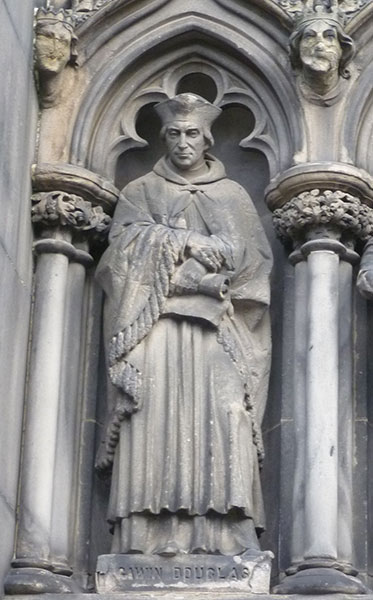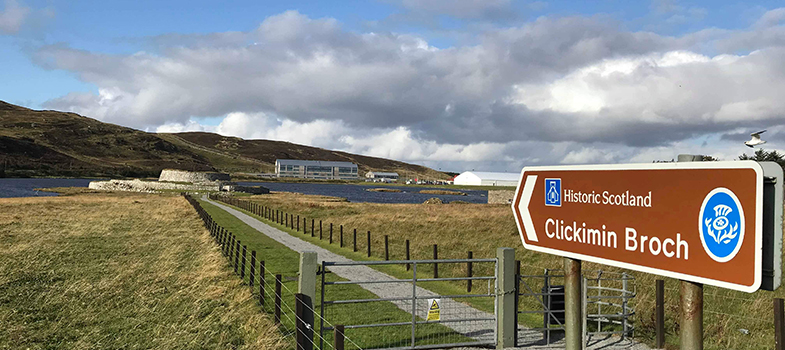14.1 The status and use of Scots from c.1100 to the present
During the 12th and 13th centuries, Scots (or ‘Inglis’ as it was then commonly known) expanded into areas of Scotland, which had previously been Gaelic-speaking. In this period, Scots became the most widely spoken language of the country, although Latin and French were also very important means of expression for those few people who could read and write – some churchmen, lawyers and merchants and some members of the royal court and nobility.
During this period and later, Latin was the main language of legal and academic discourse. University lectures were delivered exclusively in Latin until the early 1700s; also the Acts of Scotland’s Parliament were written in Latin until 1424, after which they were written in Scots for about 180 years.
Language Links 
To give you an impression of one the first Acts written in Scots, you can see and listen here to an extract from an Act of 1457 ordering wapinschawingis (weapon-showings) to be held throughout the land and for men to practise use of weapons instead of playing games:
Item: it is decretyt and ordanyt that wapinschawingis be haldin be the lordis and baronys spirituale and temperale four tymis in the yere. And that the fut ball and the golf be utterly cryt doune and not usyt. And that the bowe merkis be maide at ilk paroch kirk a paire of buttis and schuting be usyt ilk Sunday.…
Transcript
Item: it is decretyt and ordanyt that wapinschawingis be haldin be the lordis and baronys spirituale and temperale four tymis in the yere. And that the fut ball and the golf be utterly cryt doune and not usyt. And that the bowe merkis be maide at ilk paroch kirk a paire of buttis and schuting be usyt ilk Sunday.…
How did you find reading and listening to this extract? Can you identify links with English here? You might have found reading the extract fairly straightforward and noticed that the spelling of some of the words is close to English, and so is the word order. When looking up words from the text, such as ordanyt, in the DSL, you will see that they mostly appear in the listing of results prior to 1700, meaning that these are words where there are not many examples of use post-1700 in Scots.
There was then a transition period, which meant that by the end of the 1600s the Acts of Parliament were written mostly in English – which was from then on the language of formal writing. These changes reflect the shifting fortunes of the different languages in relation to political, economic and social developments: for a period, Scots supplanted Latin as the language of power, but was itself in turn supplanted by English.

In literature, Scots flourished from the late 14th century – when John Barbour (c.1320–1395) wrote his epic poem about King Robert I, The Brus – through to the glories of the Renaissance period when the court of James IV patronised poets such as William Dunbar (c.1460–c.1520), who wrote in a rich, ornate and complex Scots.
Dunbar’s contemporary Gavin Douglas (c.1474–1522), Bishop of Dunkeld, made a magnificent Scots translation of Virgil’s Aeneid, the Eneados, the first translation of this text into any Germanic language. Slightly earlier, the Dunfermline schoolmaster Robert Henryson (c.1420–c.1490) had written his versions of Aesop’s Fables and other poems such as The Testament of Cresseid.
All these poets acknowledged the influence of the English poet Geoffrey Chaucer on their work, but Gavin Douglas renamed the language he used as Scottis rather than ‘Inglis’: the Eneados, he said, was ‘writtin in the langage of Scottis natioun’. This was a deliberate political distancing from the English of England, although the languages used either side of the Border had already become very distinct in terms of vocabulary, syntax and pronunciation.
Activity 4
In this activity, you will be working with an extract from Eneados (Douglas, G., 1839, Book 1, line 104ff). This extract is particularly interesting as it provides a strong statement by Douglas about his use of Scots, or Scottish, as the language of his poetry.
Part 1
First of all, listen to the extract and try to follow Douglas’ statement.
Transcript
And thus I mak my protestatioun;
Fyrst I protest, beaw schirris, be your leif,
Beis weill avisit my wark or yhe repreif,
Consider it warly, reid oftar than anys;
Weill at a blenk sle poetry nocht tayn is,
And yit forsuyth I set my bissy pane
As that I couth to mak it braid and plane,
Kepand na sudron bot our awyn langage,
And speikis as I lernyt quhen I was page.
Nor yit sa cleyn all sudron I refus,
Bot sum word I pronounce as nyghtbouris doys:
Lyke as in Latyn beyn Grew termys sum,
So me behufyt qhilum or than be dum
Sum bastard Latyn, French or Inglys oys
Quhar scant was Scottis - I had nane other choys.
By the 17th century, Scots was undergoing Anglicisation under the influence of its powerful southern neighbour, and English was becoming the more dominant of the two languages (see the next section for reasons why this happened). The vast majority of the population still spoke Scots – outwith the Gaelic-speaking Highlands and Islands (Gaelic was spoken as far south as parts of Perthshire, Stirlingshire and southern Argyll until the late 18th century).
In the 18th century, there was a reaction against the dominance of English among some poets and songwriters, who often turned to Scots to express themselves. The best-known figures of this ‘Vernacular Revival’ are Allan Ramsay (1684–1758), Robert Fergusson (1750–74), and Robert Burns (1759–96).
After the Union with England of 1707, Scotland retained its own legal system, and Scots continued to be regularly spoken in the law courts by advocates and judges, as well as by some witnesses, as late as the first decades of the 19th century, even though all written and printed documents had long been produced only in English. In 1794, Robert MacQueen, Lord Braxfield (1722–99), said of Francis Jeffrey, who was newly an advocate in Edinburgh after having attended Oxford University: ‘The laddie has clear tint [lost] his Scotch and fund nae English’. This comment suggests that it was normal for Scots to be used by lawyers during this period. (Source: Rogers, P. (n.d.), Boswell and the Scotticism.
In the last 200 years or so, the division between English as the language of education and all formal usage including in the media, and Scots as the daily oral language of many Scottish people, has become firmly established. In the same period, English became a powerful global language, putting more pressure on Scots speakers to modify or abandon their Scots speech in most formal settings. However, as you will learn in the next section, this process has been going on for a much longer time.
14. Introductory handsel
